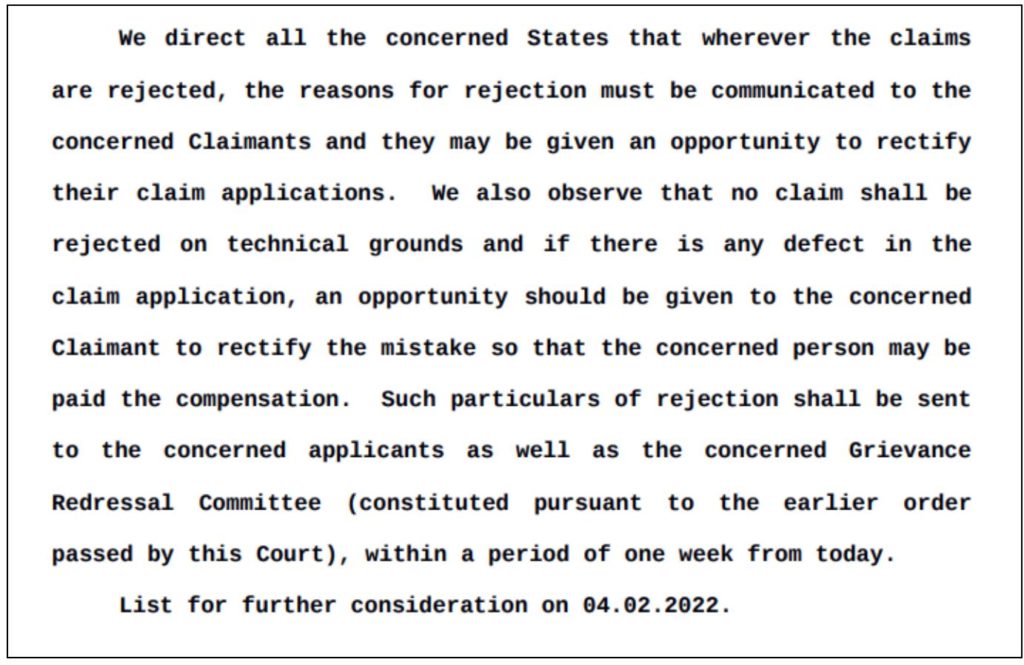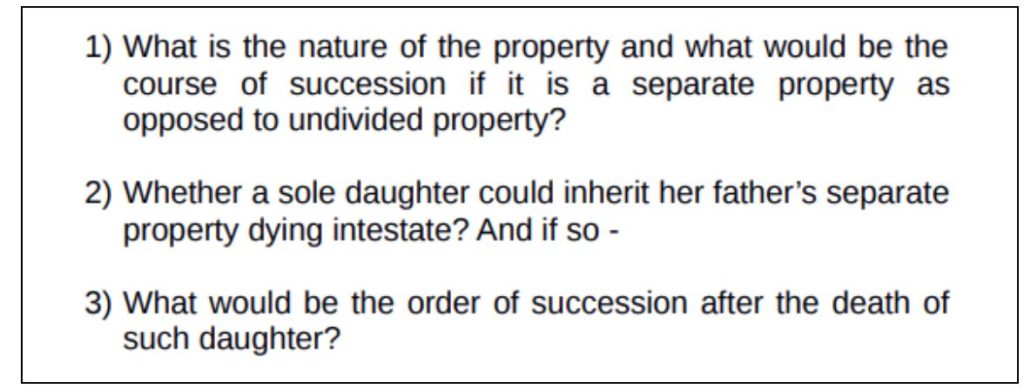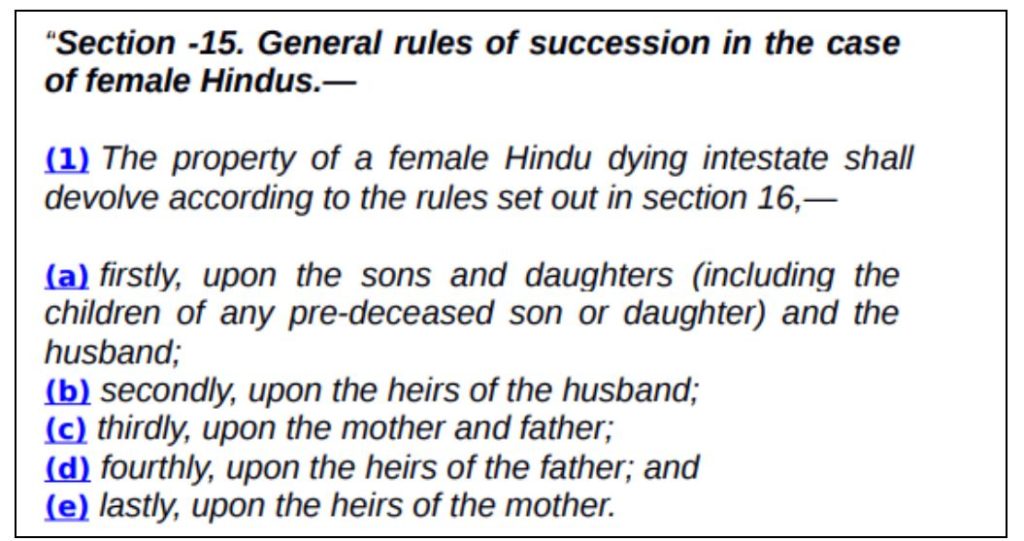In this roundup of Court Judgements, we look at the Supreme Court’s observations & directions on the rejection of claims for compensation of COVID-19 deaths on technical grounds, courts being concerned with the decision-making process, and not the decision itself, daughter’s entitlement in the inheritance of the self-acquired property or that obtained through family inheritance when a Hindu father dies without a will.
SC: Directs States to not reject claims for compensation of COVID-19 deaths on technical grounds
When considering the case, Gaurav Kumar Bansal vs. Union of India which monitors the disbursal of ex-gratia compensation of Rs. 50,000 for COVID-19 death, the Supreme Court bench comprising of Justices M.R.Shah and Sanjiv Khanna directed the States to not reject claims on technical grounds. Furthermore, the bench also said that wherever applications are rejected, it is the duty of the States to inform why it did so to the concerned claimant and give them the opportunity to rectify the application. The Bench noted that Maharashtra had rejected 49,113 claims, Tamil Nadu rejected 10,138 claims, Gujarat had rejected 4,234 claims, Andhra Pradesh had rejected around 6,400 and Telangana had rejected 1,459 claims.

The Bench taking note of the non-compliance of Bihar and Andhra Pradesh with the past orders issued show-cause notices to the Chief Secretaries of the two States. Kerala, Gujarat, Maharashtra, Telangana, and Jharkhand were also pulled by the Court for their low number of disbursals of compensation claims. In Bihar, out of approximately 13,250 deaths reported, only 11,095 claims have been received. This is low compared to most states where the number of claims is substantially higher than the number of reported deaths. The bench noted that Bihar’s low numbers could be because of two reasons- either the State has not been able to reach kin and family members of the COVID-19 victims in the state or because the people are not aware that they are entitled to receive the ex-gratia compensation. The Bench asked the State to put in more efforts to reach the families of victims.
In Andhra Pradesh, the Bench noted that the State had received 41,292 claims, out of which 34,819 were found to be eligible. Further, out of the eligible Claimants, only 23,835 had received the payment of compensation and 10,984 Claimants are now to be paid, out of which 5,141 claims are cleared and the actual payment shall be made within a period of three days from the date of the order. The Chief Secretary of the State tendered an apology and stated that there was no intention to not comply with the directions issued by this Court and to not pay the compensation to the eligible claimants. He assured the Court that in future, the administration would be more vigilant.
The Court also directed the States to reach out to those children who lost both their parents/surviving parents and whose particulars are already available on the Bal Swaraj Portal so that the compensation can be paid to them. It noted that the orphans may not be able to submit applications to claim compensation and hence asked the State to reach out to them. As per Bal Swaraj Portal, there were approximately 10,000 children had lost both their parents.
The matter will be heard next on 04 February 2022.
SC: Courts are concerned with the decision-making process, and not the decision itself
In Sushil Kumar vs. the State of Haryana and Ors., an appeal was filed by a police constable against the final judgement and order of the High Court of Punjab and Haryana. The constable filed a writ petition in 2011 stating that he should have been promoted in 2004 itself and the delay in promoting is illegal and arbitrary. In 2001, the Superintendent of Police (SP) had recommended his name for promotion on grounds of bravery displayed by the constable. However, the Inspector General of Police dropped his name when forwarding names to the Central Departmental Promotion Committee. Later, in 2007, the constable’s name was yet again forwarded by the SP and passed by the IG, and he was granted promotion with effect from 2008. In his petition, he sought retrospective promotion with effect from 2004. The High Court dismissed the plea citing that selection is not a matter of right.
The Supreme Court bench comprising Justices K.M.Joseph and PS Narasimha cited that the matters relating to the promotion of Constables to the rank of Head Constables are governed under the Punjab Police Rules, 1934 as applicable in Haryana, and that the recommendation of the SP at the initial stage is alone, not sufficient to claim a right for promotion. Furthermore, the bench stated that the merits and accolades of the candidates recommended for promotion varies every year on a comparative merit scale, and so the scrutiny is dynamic.
The Bench upheld the High Court’s judgement praising the Single Judge and Division Bench for not getting into individual comparative merit. The Bench further observed that the Courts are concerned with the decision-making process, and not the decision itself, in judicial proceedings.

SC: Daughter is entitled to inherit the self-acquired property or that obtained through family inheritance when a Hindu father dies without a will
Arunachala Gounder (Dead) vs. Ponnusamy, involved a dispute over the property of Marappa Gounder who passed away in 1949. Marappa Gounder had a daughter Kupayee Ammal who died issueless in 1967. Marappa Gounder had a brother who had 5 children- a son and four daughters. One of the daughters, Thangammal filed suit claiming a one-fifth share in the suit property as she was one of the heirs of Marappa Gounder’s brother.
The Trial Court concluded that Marappa Gounder had died before the enforcement of the Hindu Succession Act, 1956 because of which Thangammal and her sisters were not the heirs and not entitled to the one-fifth share of the property. In 1994, the Trial Court dismissed Thangammal’s plea. She then filed an appeal at the Madras High Court, which also dismissed the appeal in 2009.
According to the Supreme Court, the primary issue for consideration, in this case, was regarding the right of the sole daughter to inherit the self-acquired property of her father, in the absence of a will before the enforcement of the Hindu Succession Act, 1956 or in other words, the case was whether a suit property will go to the daughter upon the death of her father intestate (father not having written a will) by inheritance or will it go to the father’s brother’s son by survivorship.
Three questions before the Apex Court were the following.

To address the issues, the Supreme Court bench comprising of Justices S Abdul Nazeer and Krishna Murari referred to the customary Hindu Law, the sources of the property law, ancient Hindu explanations of inheritance, and judicial pronouncements. The Bench observed that the right of a widow or daughter to inherit the self-acquired property or share received in the partition of a coparcenary property of a Hindu male dying without a will is well recognized not only under the old customary Hindu Law but also various judicial pronouncements. Further, it added that the self-acquired property or a family property of a Hindu male who dies without a will, will be devolved by inheritance and not survivorship, and the daughter is entitled to the same.
Thus, in this case, Kupayee Ammal, daughter of Marappa Gounder will inherit the suit property.
With respect to the third question, if a female Hindu dies issueless without leaving a will, then the property inherited by her from her parents would go to the heirs of her father whereas the property inherited from her husband or father-in-law would go to the heirs of the husband. If a female Hindu dies leaving behind her husband or any issue, then Section 15(1)(a) of the Hindu Succession Act is applicable under which all her property, including that which she acquired from her parents, will go to her husband and children.
In this case, the properties upon the death of Kupayee Ammal in 1967, if the 1956 Act is applied entitles Marappa Gounder’s brother’s daughter, Thangammal to 1/5th Share in each of the suit properties.

SC: Reiterates that the High Court cannot issue direction to the State to form a new policy
In Krishan Lal & Ors. vs. Vini Mahajan Secretary & Anr., the Apex Court was considering the grievance of the petitioner that the directions given in the order were passed by the High Court of Punjab and Haryana dated 27 August 2014 have not been complied with. They stated that they were entitled to the same relief granted in the case of Dr. Naresh Kumar Kataria and Ors vs. State of Punjab and Ors in which the Court was dealing with pay parity and granted the benefit of notional fixation to the petitioners with liberty to the petitioners to represent regarding grant of actual benefits. Further, the relief given to Dr. Naresh Kumar Kataria was based on the applicable policy of the concerned Animal Husbandry Department whereas here the claim of the petitioner was processed as per the policy of the concerned Health Department. The bench of Justices AM Khanwilkar, Dinesh Maheshwari and CT Ravikumar re-iterated that the High Court cannot issue direction to the State to form a new policy.

Featured Image: Important Court Judgements


